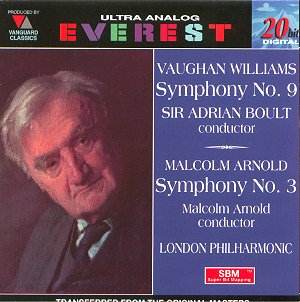VAUGHAN WILLIAMS
Symphony No. 9
ARNOLD
Symphony No.3
Boult introduces RVW9 0.26
 LPO/Boult VW9 34.34 LPO/Arnold
Arnold 3 34.44
LPO/Boult VW9 34.34 LPO/Arnold
Arnold 3 34.44
recorded and first released 1958/59
 EVEREST EVC9001
[70.25]
EVEREST EVC9001
[70.25]

Two British symphonies of the 1950s. One a restless 'ave atque vale' by the
Grand Old Man who died days before the sessions - the other by a young man
still in the foothills of his career. Both were active in film music.
Boult's first Decca cycle of Vaughan Williams symphonies stopped at No. 8
so this disc is THE complement to that set (now Belart). The Everest taping
is miraculously good. The symphony is both troubled and tranquil. Its closest
brother is the sixth symphony. Both celestial palace and prison house shades
- benediction and malediction - inhabit this ultimately uncomfortable and
discomfiting score. Vaughan Williams takes pleasure in the exotic with a
trio of saxophones and a flügelhorn. The music owes some of its material
to his music for a BBC radio adaptation of Hardy's Mayor of
Casterbridge. This links to 'haggard Egdon' and Holst's own bleak Egdon
Heath itself hinted at in the andante tranquillo.
Arnold's Third Symphony is a generous coupling. The work is broadly
contemporaneous with the VW9. Arnold conducts the orchestra of which he had
been first trumpet. In symphonies 7 and 9 Arnold's language became less
accessible but here, as in most of his works, he is determinedly tonal and
populist influenced by Sibelius and Mahler. Arnold took an interest in Mahler
long before he became a 'hip' 1960s phenomenon. I still recall the Sunday
Times Colour supplement which, in the late 1960s, celebrated Mahler as a
major 'find'. Arnold uses the percussion less than in Numbers 4-6. The work
is jaunty in the finale (touching on his charming and disarming film music
style) but gripes and struggles its way through the first two movements.
The themes do not have the catchy memorable quality of those in symphonies
1, 4, 5, 6 and 8.
Both works were recorded in stereo using half inch three track magnetic tape.
The original masters were used for this disc. I noticed some bassy bumps
in the first movement of the RVW (e.g. at 0756) but nothing too distracting.
Decent notes by Paul Affelder.
A great mid-price bargain and an enduring triumph for Everest.
Rob Barnett

